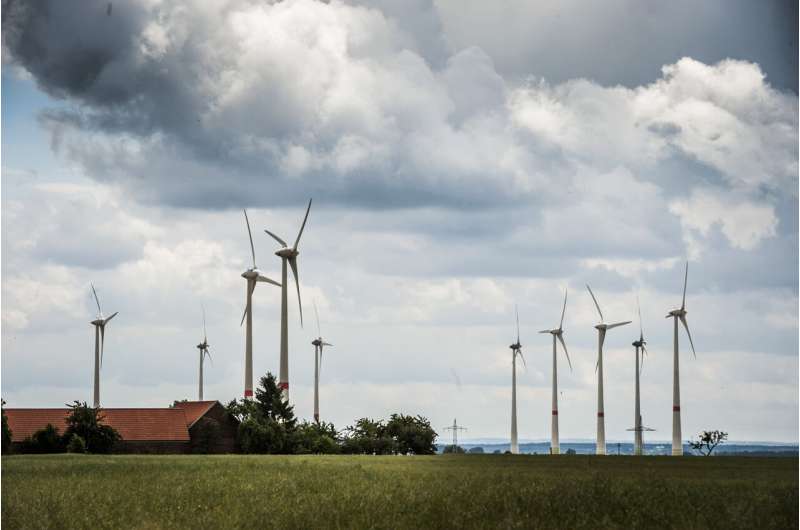by Bianca Schröder, Forschungsinstitut für Nachhaltigkeit Helmholtz-Zentrum Potsdam

Though a majority of Europeans assist the vitality transition in precept, native opposition to needed infrastructure tasks is on the rise. What may very well be performed to clean the longer term progress of renewables in Europe? In a new study printed in iScience, researchers have recognized the preferences of residents in Denmark, Germany, Poland and Portugal.
In all 4 nations, residents expressed a transparent choice for low electricity costs, much less dependence on electrical energy imports, and favor solar power. Crucially, the research revealed that respondents have been additionally prepared to compromise and have been ready to simply accept trade-offs if these enabled them to safe extra most popular qualities within the vitality system.
“We needed to seize residents’ preferences as realistically as doable and selected a conjoint experiment as our analysis technique, which includes weighing up the choices. We avoided asking individuals’s opinions on particular person points resembling applied sciences, location and prices, however moderately confronted the respondents with completely different profile choices after which needed to know the way they’d resolve in every case.
“This method acknowledges that individuals could battle to supply dependable solutions to direct queries concerning a future system they aren’t acquainted with,” explains lead creator Franziska Mey from the Analysis Institute For Sustainability—Helmholtz Centre Potsdam. In all, 4,103 individuals have been surveyed in 4 nations for the research.
Value and share of vitality imports matter most
To establish citizen preferences for several types of renewable energy futures, the researchers offered six system attributes identified to have an effect on mission and coverage acceptance for the energy transition: the dominant know-how, land necessities, the extent of electrical energy imports into the area, family electrical energy pricing, growth of transmission grid capability and the possession of vitality provide property (i.e., whether or not property are publicly or privately owned). The survey revealed that electrical energy pricing has by far the best affect.
“The electrical energy value attribute triggered the most important results, with reactions to rising costs being greater than twice as sturdy as reactions to rising shares of imports. Comply with-up questions confirmed this choice and made it clear that our future electrical energy system must be each cost-efficient and socially equitable,” says Franziska Mey.
A low share of electrical energy imports ranked second: If residents might resolve, the longer term electrical energy system could be decentralized, primarily based on a provide with a excessive share of rooftop photo voltaic vitality, community-owned, and wouldn’t considerably depend on imports. When it got here to the selection of know-how—which ranked third as a precedence—respondents most popular photo voltaic over wind energy, with rooftop photo voltaic techniques gaining the very best approval.
In Germany and Denmark, that are equally superior within the vitality transition, very comparable preferences have been evident. In Poland and Portugal, the import share was rated as much less vital. Poland differed notably by way of value preferences. That is maybe as a result of comparatively low value of electrical energy in Poland (€0.15/kWh in 2021; Germany: €0.32/kWh in 2021).
Residents’ preferences needs to be accounted for in vitality system fashions
The findings of this research additionally present that residents are prepared to make trade-offs. For instance, by weighing much less most popular points resembling increasing wind power era or a excessive share of imports in opposition to decrease costs. This makes it doable to develop very completely different techniques with the same diploma of utility.
The findings of this research can be utilized to enhance vitality fashions used to assist decision-making on the electrical energy system of the longer term. “Right this moment, vitality fashions are sometimes used that target applied sciences and economic aspects however which fail to sufficiently account for social aspects resembling residents’ preferences. All too usually, individuals’s opinions are surveyed after situations have been created.
“Our analysis allows the direct integration of residents’ preferences into vitality fashions and thus into the design of situations, thereby contributing to a fairer vitality transition,” says co-author Tim Tröndle (ETH Zurich). Because the authors’ observe, opinions change over time and surveys ought to ideally be carried out at common intervals.
Extra info:
Franziska Mey et al, Visions for our future regional electrical energy system: Citizen preferences in 4 EU nations, iScience (2024). DOI: 10.1016/j.isci.2024.109269
Offered by
Forschungsinstitut für Nachhaltigkeit Helmholtz-Zentrum Potsdam
Quotation:
Europeans need decentralized energy era and low costs (2024, March 13)
retrieved 13 March 2024
from https://techxplore.com/information/2024-03-europeans-decentralized-power-generation-prices.html
This doc is topic to copyright. Other than any honest dealing for the aim of personal research or analysis, no
half could also be reproduced with out the written permission. The content material is offered for info functions solely.







